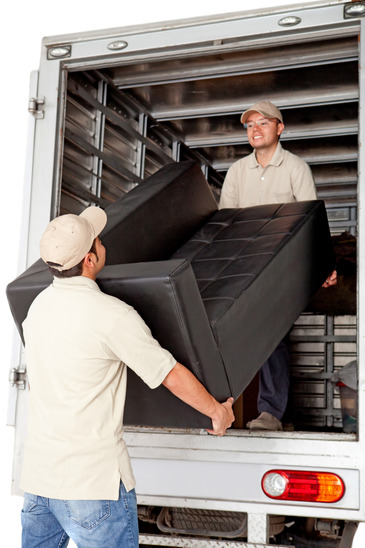54 Ways To Get Ready For Your Move

Moving is going to be very stressful no matter how well you prepare. However, you can start preparing sooner than you may think. We’ve compiled an action list starting at 8 weeks out from your move date. Hopefully it helps make your move a bit easier.
8 weeks before your move:
- Designate a file titled “move file”. This is necessary to keep track of estimates, receipts, and other important information.
- Before you begin to pack anything, take inventory. This can be done through photos, videos or making a list of all of your possessions. In the event of a dispute, breakage, loss, etc., you will have proof of the original items in question.
- Arrange for your items of high value to be appraised and make sure they are properly insured.
- Put together a list of what your mover will be transporting, what you will be moving yourself, and what you will be leaving behind or disposing of through a sale or donation.
- Check with the IRS regarding possible tax deductions for moving expenses. Make sure you keep proper documentation to support your deductions. http://www.irs.gov/taxtopics/tc455.html
- Begin contacting and researching licensed professional moving companies to get multiple moving quotes. It is recommended that you interview and received binding estimates from each of them before you make your final decision. Contact your Better Business Bureau to insure that the company you select has a reputable track record.

- Specify in your interviews with various moving companies if you are going to need additional services, such as moving a piano and a pool table, or special packing requirements for arts or antiques. Also, decide how you want to handle the packing on move day: are you planning on packing everything prior to the moving company’s arrival? Do you want partial packing from the moving company or would you prefer to let the moving company pack your whole house?
- If you need to ship your automobile, research auto shipping companies.
- Research your new community. Contact your Chamber of Commerce to request their new resident packet.
- Draw out a floor plan of your new home to begin the process of deciding the function of each new room. Begin to think about which items in your current home will work in your new home.
- Consider your means of transportation to your new home. Perhaps you will need air plane reservations, hotel reservations or a possible car rental. Check into fares well in advance in order to secure your best price.
- Clean out your closets, drawers, bookcases, garage – and begin to plan for a garage sale or sell on eBay. It is pointless to pay to have items moved that are no longer necessary or valuable to you. This can be a huge money saver – and money maker! Whatever is left over after the garage sale, arrange to have donated. Schedule a charity to send a truck to your home immediately after the garage sale to clear out the remaining items.
7 weeks before your move:
- Begin compiling medical and dental records – including prescriptions and shot records. Perhaps you will be able to secure a referral for a new health care provider from your currents doctors and dentists.
- Arrange to have school records transferred to your children’s new school district and/or daycare. Transcript requests can be lengthy transactions, so be sure to allow proper amount of time.
- Contact your insurance agent to see what changes to expect in your policies for changing state. Make sure that a loss incurred from damage or loss while moving is covered. In addition, arrange new insurance for your new home. This includes homeowners, auto and medical insurance.
- Choose a new veterinarian for your pets and schedule to have the records transferred from your existing vet.
- Contact your attorney and accountant to secure copies of any legal and financial records you need.
- Begin using things that cannot be moved, such as frozen foods, bleach and aerosol cleaners.
- Start reading the local newspaper online of your new city. This will enable you to start learning about the local events and culture.
- Contact health clubs or other organizations you have joined. Ask how to move, sell, or end your membership.
- Make a list of things that are valuable or difficult to replace. Plan on shipping these by certified mail or carrying them with you.

4 weeks before your move:
- Plan for short-term or long-term storage at your new destination if needed.
- Start pinpointing a “move date”.
- If you will be doing some of the packing, begin acquiring the necessary moving and packing supplies. Moving boxes and supplies are specially made to handle the demands of moving and it is not a good idea to use old, previously used boxes.
- Begin packing items you do not use very often.
- Advertise and host your garage sale. If you donate the items not sold, be sure to get a receipt for income tax records.
- File a change of address with the Postal Service. If you still are unsure about your new address, you may request that your mail be held at their office in your new city.
- Schedule introductory doctor and dentist visits in your new home city to avoid experiencing a medical/dental emergency without any resources to assist you or your family. Perhaps consider getting routine medical, dental and vision checkups before you leave.
3 weeks before your move:
- Alert service providers such as landscapers, pool cleaners, housekeepers, of your upcoming move. You will be able to schedule their final work days before you move out to ensure that there will be no outstanding financial obligations.
- Schedule disconnection of all utility services at your old home, and connection of them at your new one. A helpful hint is to schedule disconnection for the day after you leave, and schedule new service the day before you arrive at your new home. Be sure to request your refunds for “last month” deposits for utility services. This includes water, electric, cable, telephone, and gas.
- Confirm your pet’s travel arrangements. If you are moving long distance, consider some of the respected animal moving companies such as Air Animal or Animal Land.
- This is a good time to make sure your pets have all of their required shots. Some states require current health certificates and verification of rabies inoculations.
- Call your existing newspaper service and set a date to cancel your subscription. Contact your new local newspaper and give a start date to begin service.
- Return all library books and pick up any outstanding dry cleaning or alteration orders. Also retrieve any items out on loan.
- Determine what are the options for your plants. Some states prohibit the moving houseplants, so check with your moving company. If you will not be able to move them personally, maybe the plants can be donated or given to neighbors.
- Dispose of flammable, corrosives and poisons.
- Be sure you know the location of the title and registration of your vehicles so you will be able to quickly register them in your new home town.
- Service your automobiles if a long drive will be necessary.
- Reserve the use of the elevator if you will be moving into or out of an apartment.
- Confirm your actual moving day with the movers and let them know if there have been any changes to your inventory since they performed their in-house survey. Ask for the changes in writing. If you are going to need some additional storage for your household items at your new destination, review this information with your moving company.
- If you plan on utilizing outside storage facilities after your move, research price quotes and availability.
- Finalize the reservation with a car shipping company, if you are transporting your car.

2 weeks before your move:
- Begin the process to close or transfer your financial bank accounts. Clear out safety deposit boxes.
- Contact creditors of your upcoming move.
- To help empty your refrigerator and avoid the need for appliances already packed, plan your meals for the last week of the move.
- If you are inclined, assemble a folder of important information about the house for the new owner of your home.
- Make childcare arrangements for moving day.
- Give away plants not being moved.
1 week before your move:
- Notify family and friend of your new address and phone number.
- Pick up dry cleaning, return library books
- Prepare your “essentials” box. Finish packing and designate which boxes are “last load” items, so they will be the first boxes unpacked. Be sure to pack your valuables separately.
- Appliances need to be prepared for the move. This can be professionally done, if necessary. Empty gas and oil from your mower, gas grills, kerosense heaters, other motors, etc.
- Empty, defrost and clean your refrigerator.
- Refill any medications you or your family might need for the next couple of weeks.
Good luck with your move day!